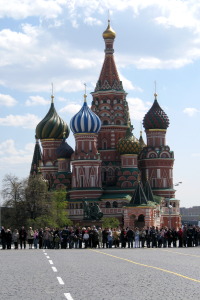The Rise of Russia and China: The New Tourists of Europe
There is a sense that Europeans are growing bored of Europe. Cheap flights mean that more and more of us have been able to visit the top destinations in Europe and are now looking for further flung destinations. This bonanza in cheap air travel doesn’t mean disaster for European destinations though. We are now seeing an influx of travellers from more remote countries such as Russia and China. In 2012 Chinese travellers spent $100 billion overseas. During the Soviet period, many Russians were effectively banned from travelling abroad. They now rank in the top ten of international travellers in terms of numbers. As the largest and most populous countries respectively, they really are just too big to overlook.

Mass industrialisation and rapid wealth creation in these countries have created a new generation of international travellers.
The question whether the next decade will see more international travel from Russia and China is almost certain. How to appeal to this growing market will be the real question. Translations, social media and highlighting the major sites and proximity to others will be the key. With visas being arduous to acquire, many visitors from China and Russia aim to make the most of their trip and visit as many famous locations and countries within Europe as possible. One may take for granted that a visitor to Paris can safely expect to see the Eiffel Tower but this may not be the case for travellers from places as far away as China or Russia. Travellers are going to want to know that your property will allow them visit all of the major attractions. If you can show that your property will allow your guests to see all of the major sites this will be a major advantage. Also, European distances pale in comparison to travel in Russia and China. Guests will want to know about attractions in other cities, even other countries.
Despite the mass appeal, traditional modes of advertising may not be effective for these markets. Facebook is banned in China, and the most popular social network in Russia is VK which remains relatively unknown in the West. These sites are available in various languages and will help with your exposure. Baidu replaces Google in China. To really rank on this search engine you will need a translation of your site into simplified Chinese and have a local Chinese domain. These might seem like arduous tasks but the expansion of tourism from these areas in the upcoming decade may make it a question of when rather than if for most sites. Having your site in cyrillic will also be integral when appealing to Russian travellers.

As well as the obvious difficulties with the language, there are also numerous cultural differences to negotiate. For example, in China, the first price quoted is open for haggling. If you have flowers for your Russian guests, make sure you have an even number, odd numbered bouquets are reserved for funerals. There is likely to be confusion at some point but any concessions are bound to be appreciated. There are websites where you can register your apartment as suited to Chinese tourists. Even just checking sites like these can give you a good idea of what is expected by travellers to your property.
Whilst marketing your property to these new markets may be difficult to do as effectively as normal, the sheer numbers available means that even basic efforts should be lucrative. Tourism from Russia and China is going to develop exponentially in the next decade. Russia’s outboard tourism expenditure increased 32% in the previous ten years and China is currently the largest spending nation on foreign travel. Just as vacation rentals have appealed to the European market for the value and quality they offer, there is bound to be a huge demand as travel to Europe and America from the East increases.







